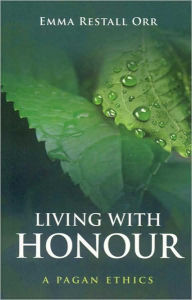This is a difficult book. Academically challenging and controversial, it attempts to define the Pagan community and then proposes a unified vision of ethics. I took issue with the very limited way that Emma Restall Orr defines Pagans as those whose beliefs are nature-based and animistic. Writing to a British audience, I found many differences in what is considered the norm in Britain vs. America. With the cultural assumptions of the author based so firmly in the culture of Britain, there are a number of ideas that are even less likely to be accepted by foreign Pagans. What is perhaps most successful in her writing is the ability to express the sacredness of all creation. I understand how this view leads her to champion acting with honor towards the spirit of both the animate and inanimate. What falls short are her arguments for adopting certain lifestyle and behavioral choices based on her view of what Paganism is and what animistic Pagans value.
Emma Restall Orr acknowledges the folly of this endeavor and admits she may not have the academic credentials for this undertaking. Her authority to do so is based on her influential role in Britain as a Druid and a writer. She develops an idea of honor as being a matter of good relationships that extends beyond human relationships to our relationships with other animal species, plants and forces of nature. She is an animist at heart. Her idea of ethical living is about the holistic interaction with the greater web of being.
At first I was impressed by the exploration of Western philosophy that begins this treatise. After a while I found it a bit of slog to get through. Parts of this book are easy to navigate and others are hard. While the philosophy review is well thought out, as soon as Emma Restall Orr veered into modern ethical issues, I begged to differ with her often. So often that I could have written a refutation of many of her ideas instead of a review.
It's a tough sell to promote any standardized set of ethics to people with different ideas of deity and spirituality, never mind export a book rooted firmly in British soil. These ethical dilemmas are controversial and very British. For example arguing about the ethics of paying for exceedingly expensive fertility treatments in a system of British universal health care falls flat in the US where the only thing universal in health care is inequity. She argues that euthanasia is a valid option for Pagans who value quality over quantity of life, that fertility treatments may not be for the greater good in an overpopulated world, that animals deserve to be treated with the same respect for life we afford humans and that our use of animals is specist. She urges Pagans to adopt a vegan diet believing it is not possible as an animist to respect the spirit of an animal and eat it.
The crux of the problem with the notion of unified Pagan ethics is that what is suitable to one community may be untenable and ridiculous in another geographical location. A vegan diet can be done sustainably in the tropics and fail miserably in the Arctic. This book is brave and foolhardy. Brave because having a standard of ethics could protect the Pagan community from being defined and maligned by outsiders. Foolhardy because the diverse beliefs of Pagans are too disparate to rally around. This book will be most interesting to readers seeking insight into modern British Pagan and Druidic thought.
~review by Larissa Carlson
Author: Emma Restall Orr
O Books, 2007
pp. 357, $24.95
Living with Honour: A Pagan Ethics

©
2010 - 2024
Facing North
